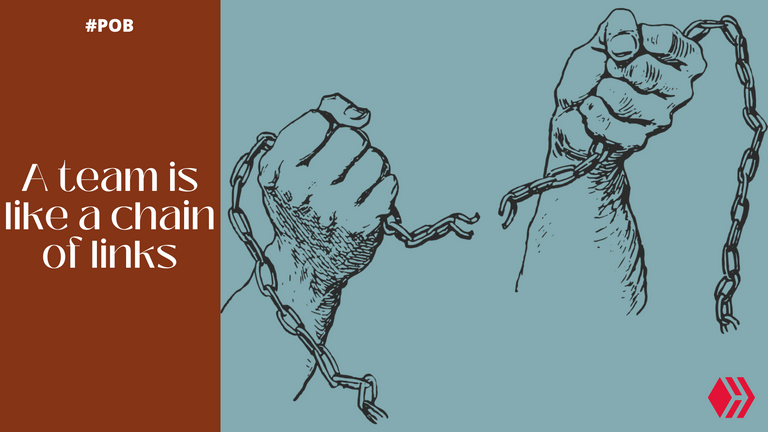
If you believe that teamwork is only something you do at work, you are mistaken. It's ingrained in your daily routine, whether you're at home, school, or church. Working as part of a group is one of the most valuable skills you can acquire, and it's never too early to start.
"Teamwork" refers to the ability to work collaboratively toward a common goal. Personal accomplishments can be channeled into organizational ambitions. It's the fuel that allows regular people to achieve amazing results.
No matter how teamwork is touted to be beneficial for organizational performance and in reaching shared goals, a team can be fatally flawed by one or more individuals within the team.

Consider a team as a chain with many links that contribute to its length and strength. If this chain is used to secure an object, how many links must be broken to weaken the chain? Obviously, all it takes is one broken link to weaken the entire chain, no matter how strong it is.
Just like a chain, an individual that works against a team, whether wittingly or unwittingly, is enough to break a team.
So, could you be the problem for your team? Could you be the one hindering the success of your team?
Ways you could be hurting your team
Here are some signs that may show that a person is becoming problematic for a team they belong to:
1. You are excessively brilliant, and you believe you are the most brilliant: There are normally four stages of team development. Forming: the coming together of team members, storming: following team members' interactions, there will be perceived areas of disagreement; norming occurs when team members look past differences and align their expectations; and performing occurs when team members understand themselves, set goals, and work together to achieve the set goals. If you are too brilliant, you may eventually leave your team in the storming stage with either opinions to counter those of another team member or an unending flow of ideas. The brilliant and talented mind is sometimes the most unpleasant and annoying. The issue with them is that their tremendous value is lowered because most teammates do not like them, and hence they are unable to work with them. The team is never able to move past the storming stage.
2. You lack faith in your team and teammates: High levels of trust between members are one of the cornerstones of successful teamwork, but this takes time to develop, and many work teams are temporary arrangements. Aside from this, some teammates just have trust issues and are highly suspicious. A member of the team may find it hard to express trust in individual teammates and/or the entire team's direction.
3. You are not communicating: Low-performing teams frequently begin with low levels of communication, rising to a central peak, plateauing, and then rising again as they battle to meet their goals. Lack of communication could stem from a lack of feedback from coworkers, or at the very least, poor feedback. Others' incapacity to communicate effectively is demonstrated by their choice of words, excessive use of vocabulary, and speaking in ways that are difficult to understand by others.
4. You still feel independent: Some people can never get past their independence, even within a team. They believe strongly that they have to do things their way, an ideology that is against the whole concept of a team. Such individuals still think and act independently. To refrain from making decisions that negatively impact a team's efficiency, it's essential to understand how closely team members must work together to achieve their goals.
5. You and your teammates are having interpersonal conflicts: It is healthy and necessary for high-functioning teams to have frequent disagreements regarding ideas or processes. However, when an idea or process dispute turns into a personal conflict, it can be fatal to a team. Idea conflicts are the optimum type of dispute to have amongst teams. If an individual tries to transfer interpersonal difficulties into idea conflicts and is always trying to refute other team members, it will be a terrific team breaker.
What You Should Be Doing

- Regardless of how smart we believe we are, we should always create room for compromise and try to collaborate with our teammates. If you have a lot of ideas, write them down and deliver them to your audience one by one.
- Build your faith and trust in your team. Believe in yourself and your team's ability to achieve your objectives, and inspire your coworkers to do the same. Maintain a positive attitude toward your team's role.
- Early and frequent communication is essential. Also, be clear in your communication.
- Always keep in mind that you are a member of a team. Even if you're the team's leader, try to include your teammates in critical choices. Keep in touch with your teammates at all times.
- Listen to concepts rather than facts, and focus on what the individual is trying to express to you in general rather than the specifics. Defer judgment; wait until the end of the conversation to make a decision. Investigate evidence that contradicts your own viewpoint, play devil's advocate with your own beliefs.
Conclusion

Teamwork is crucial to organizational performance and the ability to achieve common goals in any setting, whether religious, academic, or workplace. Each member of a team contributes to the team's success, but each individual also has the potential to undermine it. May we all be found to be on the bright side of teamwork.